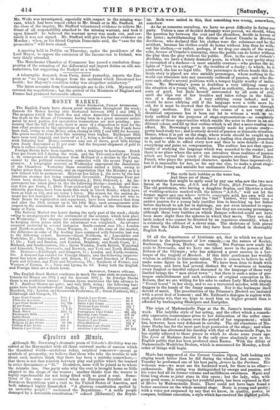trutrro nth guir.
4Ithough Mr. Browning's dramatic poem of Colombe's Birthday was re- ceived at the Haymarket with all those outward marks of success which the theatrical world—credulous today, sceptical tomorrow—accept as symbols of prosperity, we believe that those who take the trouble to talk about such matters think that there has been a mistake somewhere,— that there is not that relation between play and public which the learned in attire denominate a "fit." Doubtless, issue will be joined as to where the mistake lies. One party asks why the coat is brought home so little adapted to the shape of the wearer ; another thinks that the wearer is highly reprehensible for not being fitted with so good a coat. Some- thing of the same sort occurred when an European Royalist and an European Republican paid a visit to the United States of America, and both returned highly dissatisfied. "A glorious constitution spoiled by an unworthy people t" exclaimed the Republican "A noble people damaged by a detestable constitution !" echoed (Hibernice) the Royal- ist. Both were united in this, that something was wrong, somewhere, somehow.
As far as concerns ourselves, we have no great difficulty in firing our party. Unless a ease of decided deformity were proved, we should, when the question lay between the coat and the shoulders decide in favour of
the latter; notwithstanding the dictum of honest shoulders, in Hartinua Scriblems, who declared that his clothes were the substance and he the accident, because his clothes could do better without him than he with- out his clothes,—or rather, perhaps, if we drop our simile of the ward- robe, because of Crambe's reaso,ning, since the public can do better without the play than the play without the public. Now, in the case of Colombe's Birthday, we have a dainty dramatic poem, in which a very pretty story is recounted of a duchess—a most amiable creature—who prefers the de. lights of "love in a cottage" to the troubles of a duchy; to which, be it confessed, she has no legal title. The personages in whose hands this de- licate story is placed are nice amiable personages, whom nothing in the world can stimulate into any unseemly outbreak of passion, and who dis- cuss each other's several positions with a temper highly worthy of imita- tion. Mr. Browning's poem is doubtless a very. edifying essay on the situation of a young lady, who, placed in authority, desires to do all sorts of good, but finds herself surrounded by all sorts of evil, until she slips out of her troubles and takes refuge in the felici- ties of a domestic life. A very edifying essay indeed ; and it would be more edifying still if the language were a trifle more lu- cid, for it must be avowed that the teachings sometimes come through a foggy medium. But never in the course of a not vete short theatrical experience has it been our lot to witness a work - tie ut- terly unfitted for the purposes of stage-representation—so completely destitute of those opportunities which enable the actor to throw in an ad- ditional colour, and fill up that outline which is all that a mere reading can afford. Mr. Browning's poem is essentially made for private study— pretty hard study. too ; and is utterly devoid of passion or dramatic situation. Hence when it is put on the stage where words should be caught up in an instant—where the mind shouldhave a leading idea sharply presented to it, and be able to afford every now and then to miss details—it loses everything and gains no compensation. The auditor has not that oppor- tunity of studying the language which was accorded to the reader ; and there is no place where the actor can introduce those realities of passion which are beyond the reach of the imaginative student. Miss Helen Faucit, who plays the principal character, speaks her lines impressively ; but it is impossible for her, or for any one else, to make a great stage- part of the young and amiable but undramatic Duchess of Julien.


























 Previous page
Previous page